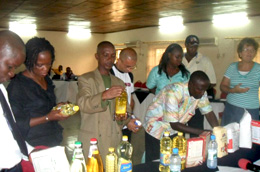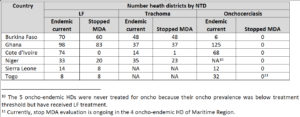Project Overview
In September 2010, the United States Agency for International Development (USAID) awarded FHI 360 a five-year Control of Neglected Tropical Diseases (NTD) Cooperative Agreement spanning six West African countries, marking the beginning of track two of USAID’s NTD control program. Subsequently, FHI 360 received a 3-year extension for the END in Africa project, which runs through September 2018.
The END in Africa project supports national health ministries and other government entities in Africa as they scale up their local integrated NTD control activities.
As the primary partner for END in Africa, FHI 360 provides overall project and financial management, coordination, quality control, project monitoring and evaluation, and knowledge management. Its partners provide capacity building in financial management, drug forecasting and supply chain management. FHI 360 has also engaged several subgrantees to assist some countries in coordinating local project activities.
FHI 360 and its partners have close relationships with governments and nongovernmental organizations in Africa, a wealth of experience developing global and country-level infrastructure, and the staff and systems to effectively support preventive chemotherapy and disease assessment activities for NTDs. The FHI 360-led team’s strategic and technical approach capitalizes on each partner’s strengths and emphasizes country ownership, collaboration, transparency, accountability, and sustainability.
Key Project Elements
- Increasing country ownership by ensuring active government participation in project activities, improving communication with government stakeholders, and closely targeting resources to support MOHs as they integrate disease control and the delivery of preventive chemotherapy into national strategic plans.
- Supporting the integration of vertical NTD control programs through the co-management of diseases to increase cost efficiencies, treat more individuals and improve program sustainability.
- Fostering collaboration among a wide range of stakeholders—brought together through effective Intra-Country Coordinating Committees (ICCCs)—to strengthen integration, achieve cost efficiencies, and maximize the impact of resources.
- Ensuring transparency and accountability through grant-making and management built on clearly defined roles and responsibilities, transparent systems, processes and procedures, open communication, and the regular sharing of data, results, and lessons learned.
- Building long-term sustainability by working with MOHs, Neglected Tropical Disease Control Programs (NTDCPs) and other country-level entities and programs in a way that strengthens national systems and capacity to deliver integrated programming.
Project at a Glance
Countries: Burkina Faso, Cote d’Ivoire, Ghana, Niger, Sierra Leone, and Togo
Diseases: lymphatic filariasis (LF, or elephantiasis), onchocerciasis (river blindness), schistosomiasis (snail fever), trachoma (blinding eye infection) and three soil-transmitted helminths (hookworm, roundworm, and whipworm)
Duration: 2010 – 2018
Results: 464.5 million treatments delivered to 221.6 million people, cumulatively; and a respective 55.9% and 69.8% LF-endemic and trachoma-endemic health districts have achieved sufficiently low levels of disease transmission to be able to stop mass treatment for those diseases across END in Africa’s six countries
Partners and sub-grantees: Ministries of Health, FHI 360 (lead), Deloitte Consulting LLP, Helen Keller International, and Health and Development International
Disease-Endemic Districts and Achievement of Transmission Threshold Enabling MDA Stoppage
More Information
Number of people to be treated for at least one NTD in FY2018
Over 129.3 million*
*Individuals may be counted more than once if receiving treatment for more than one NTD

Photo Credit: Helen Keller International


